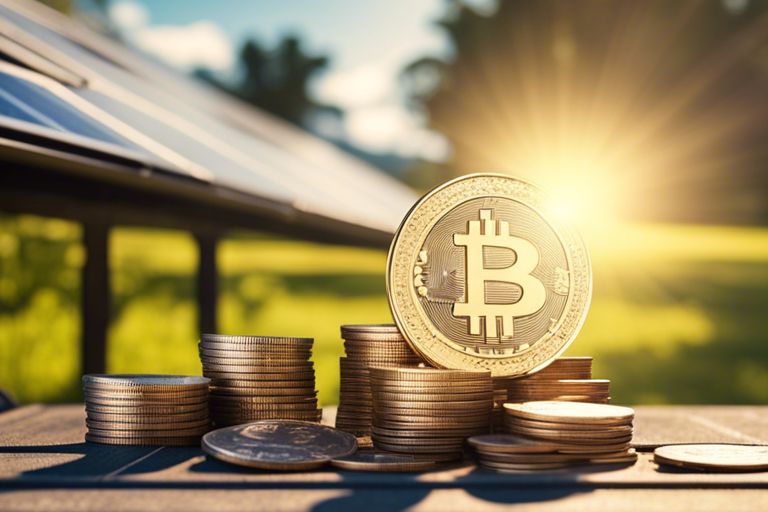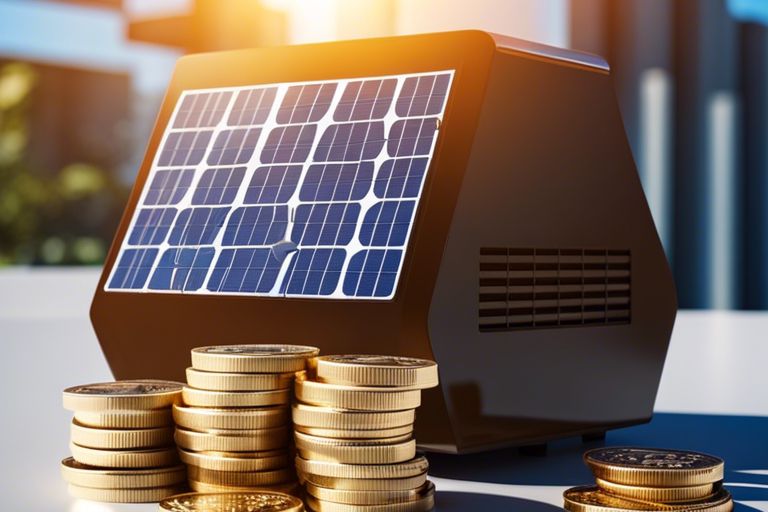Most likely, you’re intrigued by the notion of harnessing solar power with a generator, but you wonder if the investment will truly be worth it. Let’s probe into the fascinating world of solar generators and uncover whether they can indeed pay for themselves over time. By the end, you’ll have a clearer picture of the financial and environmental benefits that come with this renewable energy source.
Key Takeaways:
- Energy savings: A solar generator can save you money on your electricity bills by generating your own clean energy.
- Return on investment: Over time, the savings on utility bills can help the solar generator pay for itself in a few years.
- Government incentives: Incentives like tax credits and rebates can further accelerate the payback period of a solar generator.
The Benefits of Solar Generators
Reduced Energy Costs
With Is it worth building your own portable solar generator? How much can you save building it yourself, you can harness the power of the sun to reduce your energy costs significantly. By investing in a solar generator, you can generate your own electricity, reducing your reliance on traditional power sources. This can lead to lower monthly utility bills and potentially save you hundreds, if not thousands, of dollars over time.
Environmental Impact
An investment in a solar generator not only benefits your wallet but also the environment. Solar generators produce clean, renewable energy without emitting harmful greenhouse gases or pollutants. By opting for solar power, you are reducing your carbon footprint and contributing to a more sustainable future for our planet.
This positive environmental impact can make you feel good about your energy choices and inspire others to consider renewable energy sources as well. By using a solar generator, you are taking a small but significant step towards creating a greener and more eco-friendly world for future generations.
Calculating the Payback Period
Initial Investment Costs
Calculating the payback period of a solar generator starts with determining the initial investment costs. This includes the price of the solar generator system, installation fees, and any additional equipment needed for optimal performance. You will also need to consider any available tax incentives or rebates that can help offset some of these upfront expenses.
Ongoing Savings
Costs associated with traditional power sources, such as utility bills, can add up over time. By investing in a solar generator, you can significantly reduce, or even eliminate, these ongoing costs. Additionally, if your solar generator produces more energy than you consume, you may be able to sell excess power back to the grid, further increasing your savings.
As you continue to use your solar generator, you will notice a decrease in your reliance on traditional power sources. This decrease not only saves you money but also reduces your carbon footprint, contributing to a more sustainable future.
Factors Affecting Payback Period
Period. When considering whether a solar generator will pay for itself, there are several key factors that can affect the payback period. These factors include:
Location and Climate
Period. The location of your property plays a significant role in determining the payback period of a solar generator. Regions with more sunlight hours and less cloud cover tend to have shorter payback periods. Additionally, climate patterns affect the efficiency of solar panels. For example, areas with frequent rain or snow may impact the panels’ ability to convert sunlight into electricity effectively.
The availability of sunlight throughout the year is a crucial factor in determining how quickly you will see a return on your investment in a solar generator. The more sunlight your panels receive, the more energy they can generate, ultimately leading to a shorter payback period. The efficiency of your solar panels can also be influenced by the climate in your region, affecting the financial benefits you can reap from your solar generator.
Energy Usage Patterns
Usage. Understanding your energy usage patterns is necessary in determining the payback period of a solar generator. If you consume a significant amount of electricity during peak sunlight hours, you can maximize the benefits of a solar generator. By aligning your energy usage with the times when your panels are producing the most electricity, you can reduce your reliance on the grid and accelerate the payback period of your investment.
System Size and Efficiency
Period. The size and efficiency of your solar system also play a crucial role in determining how quickly it will pay for itself. Larger systems can generate more electricity, potentially allowing you to offset a larger portion of your energy bill. Additionally, more efficient solar panels can convert a higher percentage of sunlight into usable electricity, ultimately shortening the payback period of your solar generator.
Efficiency. Investing in high-efficiency solar panels and a properly sized system can significantly impact the payback period of your solar generator. By maximizing the amount of electricity your system can generate and ensuring that it operates at peak efficiency, you can accelerate the financial returns on your investment in solar energy.
Real-World Examples
Residential Solar Generators
Examples show that investing in a solar generator for your home can indeed pay for itself over time. According to a blog post on Why a Solar Generator Kit is an Investment that Pays for Itself, homeowners who switch to solar generators can see significant savings on their electricity bills within a few years. By harnessing the power of the sun, you can generate your electricity, reducing or even eliminating your reliance on the grid.
Commercial Solar Generators
On the commercial side, businesses that invest in solar generators can also see a return on their investment. By installing a solar generator system for your commercial property, you can significantly reduce your operational costs and increase your energy independence. This is especially beneficial for businesses that consume a large amount of electricity on a daily basis.
A commercial solar generator can help you mitigate the impact of rising energy costs and contribute to a more sustainable business model. With various financing options available, investing in a commercial solar generator can be a wise decision that not only benefits your bottom line but also the environment.
Incentives and Rebates
Keep Trickle charging Tesla using solar generator + panels in mind as you explore the financial benefits of a solar generator. Incentives and rebates can significantly impact the overall cost and payback period of your investment.
Government Incentives
To encourage the adoption of renewable energy sources like solar power, many governments offer incentives such as tax credits, rebates, and grants. These incentives can help offset the initial cost of purchasing and installing a solar generator. By taking advantage of these programs, you can accelerate the payback period of your solar generator and start saving money on your energy bills sooner.
Manufacturer Rebates
In addition to government incentives, many solar generator manufacturers also offer rebates to incentivize purchases. These rebates can further lower the upfront cost of a solar generator, making it a more attractive investment for you. Be sure to explore any available manufacturer rebates when considering your solar generator options.
Additionally, some manufacturers may offer rebates for purchasing specific models or for meeting certain criteria, such as using their products in conjunction with compatible solar panels. Researching and comparing manufacturer rebates can help you maximize your savings and ensure that your solar generator pays for itself more quickly.
Maintenance and Upkeep Costs
Regular Maintenance Tasks
All solar generators require regular maintenance to ensure optimal performance and longevity. Tasks such as cleaning the solar panels, checking connections for any signs of wear or damage, and monitoring battery levels are necessary to keep your system running efficiently. By staying on top of these tasks, you can prevent costly repairs and extend the lifespan of your solar generator.
Replacement Parts and Labor
In the matter of replacement parts and labor costs, it’s necessary to factor these into your overall budget for owning a solar generator. While solar panels themselves have a long lifespan, other components like inverters and batteries may need to be replaced over time. Labor costs for professional installation of these parts should also be considered. These expenses are important to keep in mind when calculating the payback period for your solar generator.
Having a warranty or service plan can help offset some of these replacement and labor costs. Make sure to inquire about available coverage options when purchasing your solar generator to determine the best course of action for maintenance and repairs.
Final Words
Taking this into account, it is important to carefully consider all aspects before investing in a solar generator. While it may take some time for the generator to pay for itself in terms of cost savings, the environmental benefits and peace of mind that come with having a reliable backup power source are also valuable factors to consider. Ultimately, the decision to invest in a solar generator should be based on your personal needs, priorities, and budget. By weighing the benefits and costs, you can make an informed decision that aligns with your values and goals.
FAQ
Q: Will a solar generator pay for itself?
A: Yes, a solar generator can pay for itself over time through savings on energy bills. By generating your own electricity from the sun, you can reduce or eliminate your reliance on the grid, leading to long-term savings that can offset the initial investment in the solar generator.
Q: How long does it take for a solar generator to pay for itself?
A: The payback period for a solar generator can vary depending on factors such as the size of the system, local sunlight conditions, energy usage, and initial cost. On average, a solar generator can pay for itself within 5 to 15 years through energy savings. However, with incentives such as rebates and tax credits, the payback period can be shortened.
Q: Are there other benefits to a solar generator besides saving money?
A: Yes, besides saving money on energy bills, a solar generator offers several other benefits. It is environmentally friendly, reducing your carbon footprint and reliance on fossil fuels. Solar generators require minimal maintenance and have a long lifespan, providing reliable power for many years. Additionally, having a solar generator can increase the value of your property.



